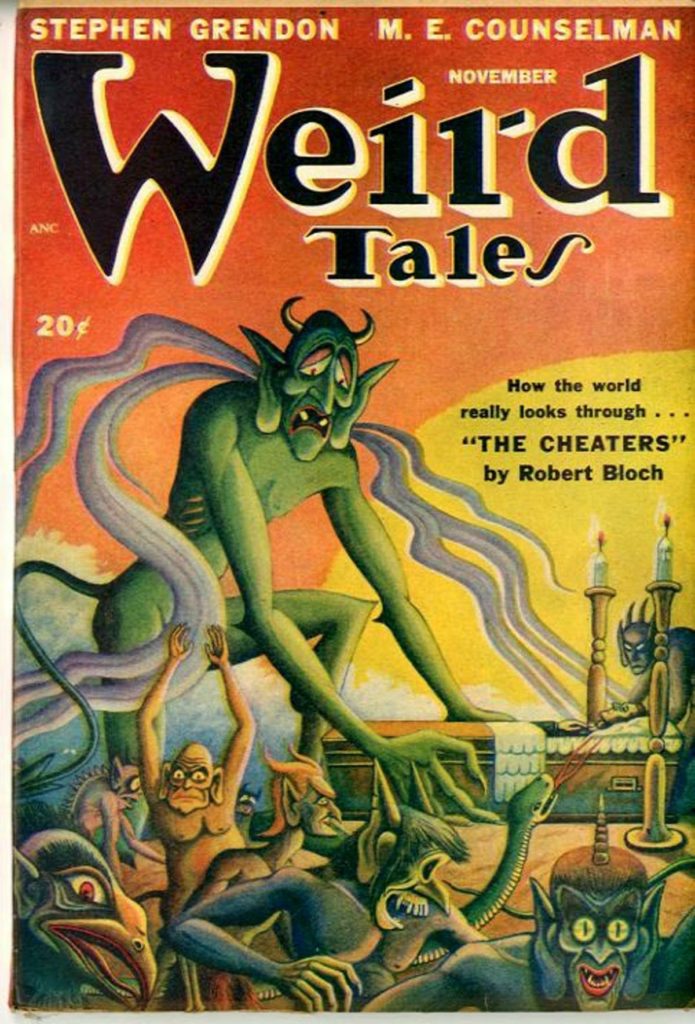Science Fiction’s Foreign Gods
Just as I arrive at Christ and Pop Culture as a new contributor, that site has been exploring more science fiction.
 Example: this feature, from contributor Geoffrey Reiter.1
Example: this feature, from contributor Geoffrey Reiter.1
I don’t mean to single out science fiction in calling its materialistic apotheoses idolatrous. On the contrary, the desire to replace the true and living God with created substitutes is a desire that inhabits the heart of every person, atheist and Christian alike. Romans 1 famously and explicitly observes the manner in which humans estranged from a relationship with God instead turn toward their own willful perversions. Every time we Christians value any aspect of God’s creation over Him, we are participating in a form of idolatry — and if we’re honest, we do this far more often than we would like.
What makes science fiction’s idolatry most intriguing is how surprisingly stark it can be, how many examples the science fiction aficionado could list that deny God but set up foreign — indeed, truly alien – gods.
Is this idolatrous impulse unique to science fiction?
Either way, how should Christian readers and viewers respond?
One way, of course, is to encourage well-written fantasy and sci-fi novels — such as by voting for your favorite nominees of this year’s Clive Staples Award. Voting begins today and is open to anyone who has read more than one of our listed nominees.
- Why Does Science Fiction Invent So Many Foreign Gods?, July 2, 2013, at Christ and Pop Culture. ↩





























One of the common tropes in TV scifi (not quite so much in novels) is the idea that the more superior alien intelligences are, the more likely they are to be non-corporeal (although they may be able to make humans perceive them as if they had physical bodies). The idea seems to be that they have mysteriously “evolved” to such a high degree that they need no longer rely on the physical. Such beings are inevitably all-knowing and all-powerful.
Seems to me this is the oldest lie around — “Ye shall be as gods.” Eve fell for that one, and her posterity continues to do the same. It’s the ultimate idolatry.
Amen, and it’s also a Gnostic concept: that the bodiless, noncorporeal form is the highest form of existence. Meanwhile God specifically refutes that notion by sending Christ as a Man, God and Man together and eternally, the incarnate Son.
There are two ideas.
First, sometimes God is meant in the sense of, “A man who has qualities regarded as making him superior to other men.” rather than as objects of worship.
Second, religious is viewed by many the materialists and humanists who write science fiction as a cultural thing. They would say that on this world there is probably some truth or some power shown by Jesus and the Old Testament God. They would say that in every myth there’s a bit of truth.
Similarly, they imagine that on other planets, there are other myths that have grains of truth. There are thus powerful beings on every planet who are viewed by some aliens as gods. On that note, I think it can be a struggle even if a science fiction writer is churchgoing to imagine that on another planet, the Christian God has been revealed.
Finally, I think as with so many issues, science fiction writers can find it helpful to talk about their views on earth-based issues by taking them off the Earth. We saw that a bit in Deep Space Nine as the character of Kai Winn really reflected a lot of the writers’ feelings about religious conservatives and the church in general.
The important thing for Christians is to really analyze what the author is trying to say with the fake religion. Is he merely introducing a powerful baddy or good guy as a “god”? Is he trying to slam religion? Is he trying to comment on some aspect of Christianity or religion. Be careful what you hear and how you hear.
Indeed, even while respecting the truth of the Bajorans’ religion and using that element of the series-arc story to challenge Federation humanism. It was amazing.
The Atheist worldview has become cliche in sci-fi. Finally. It’s good just to see sci-fi entertaining the concept of a god.